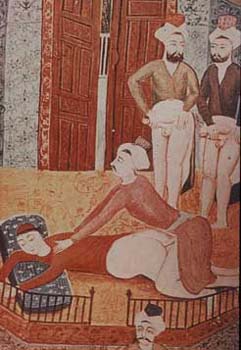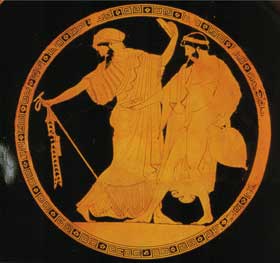 Turkey, Male Group Scene, 19th century, (miniature painting from the Khamsa of Nevi Zade Atai, Khamsa (Book of Mesnivis).
Turkey, Male Group Scene, 19th century, (miniature painting from the Khamsa of Nevi Zade Atai, Khamsa (Book of Mesnivis).
Anal rape is fundamental to relations between men. From antiquity to the present, adolescent gangs have used the threat and fact of anal rape to construct and maintain male hierarchies. In Crete c. 400 BC, young men abducted and raped younger boys who then served them as “wives” until they reached the appropriate age for marriage to women. Historian Richard Trexler writes, “It has long been a truism that the family is the foundation of the state, but . . . . those relations between males that begin in gangs and continue in these first homosexual marriages already provide a foundation for the state – that is, that set of relations between males that peaks in the power of the male sovereign.”[i] Proving the power of one man while subordinating and shaming another, anal rape can be seen as more fundamental to patriarchal social organization than any different-sex interaction.
Anal rape is an effective expression of power and weapon of terror in part because of prohibitions on anal eroticism. These prohibitions have deep historical roots in western culture. Same-sex passions were an expected part of life for men and boys in Ancient Greece, but intercrucal (between the thighs) intercourse was the prescribed practice. Anal sex, and in particular anyone who took the receptive role in anal intercourse, was viewed with deep suspicion. During the Roman Empire, anal sex was viewed as permissible within strict limits. Roman men could anally penetrate lower class men and boys, but citizens (upper-class, adult men) could not themselves be penetrated. Penetration effeminates. Being a man means always being on top.
Leo Bersani notes that the prohibitions on anal intercourse reveal sex outside its mystifications. Getting fucked means being effeminated, and that means being wounded, shamed, and powerless. Men cannot be fucked, unless they are (made into) women.[ii] The threat of being effeminated – so fundamental to relations between men – is subverted by men who embrace effeminacy. The affectations and vulnerabilities of effeminate men pose the possible pleasures, for men, of powerlessness. Effeminacy evokes the recuperation of anal eroticism, and the corresponding penetration and violation of phallic masculinity.
Of course there is no necessary association of same-sex passion with either effeminacy or anal eroticism. Other cultures may eschew the anus as a site of pleasure and prohibition. And men who love men, far from being considered effeminate, are in some cultures held to be more manly than anyone else.[iii] But in Western culture from the 19th century the homosexual is characterized, in Foucault’s well-known formulation, by “a kind of interior androgyny, a hermaphrodism of the soul,” and “a way of inverting the masculine and feminine in oneself.[iv]”No matter how macho his personal style or how tight his sphincter, every gay man, just by being gay, bears some relationship with effeminacy.
A gay man, or some part of his soul, is soft, weak and womanish – though he is not merely debased and contemptible as a woman is inside a patriarchal culture. He has a penis, but it is a means of pleasure among men, instead of a weapon of power. He has a hole; he is penetrable; but this penetration, powerlessness, and wounding is desired and desirable. Luce Irigaray writes, “when the penis itself becomes a means of pleasure among men, the phallus loses its power.”[v] When the anus becomes a means and a site of pleasure, the power of intercourse to effeminate becomes moot. If softness, weakness and vulnerability can be embraced by men, if men do not always have to be on top, then phallic masculinity becomes a joy and a toy. Relationships between men are re-envisioned as potentially playful, erotic and free.
Fortified, tough, hard, phallic masculinity is opposite to the receptivity, flexibility, softness and inwardness indicated by anal eroticism. Will Roscoe writes, “From the patriarchal point of view, we gay men castrate ourselves every time we give up male privilege, every time, especially, that we allow our bodies to be penetrated by other men. For us, penetration is the key to ecstasy because it erases the distinction between inside and outside. Most heterosexual men find this distinction indispensable to their sense of ego, which they tend to think of in terms of metaphors of fortification.”[vi]
Freud comments on the anal eroticism of all young human beings, noting children’s interest in excretory products and functions.[vii] Property too has a primary anal form. As a little boy is instructed in the significance of his genital superiority, he learns to organize his desires and explorations under the aegis of the phallus. Anality is repudiated; the anus is a hole too much like the mother’s. Just so, the boy’s real prick – the feeling, trembling penis – is something he is no longer allowed to play with. The Oedipal interdict prohibits his desire, and offers instead an insentient, indifferent identity with the Big-Prick-In-The-Sky. The little boy’s struggles against the prohibitions on his sentient body have been described by psychoanalysis. The intended resolution of this “complex” is that the little boy accepts these prohibitions by acknowledging the threat of castration (acknowledging sexual difference), but assuming that he will one day possess the Big Prick of his (dead) father. This resolution is only the “ideal fiction” of mental health. More often, “success is achieved at the price of a rift in the ego which never heals but increases as time goes on” (Freud).[viii] There is a licit identity-with-the-phallus, where he speaks with all the authority of phallic masculinity: insentient, closed, fortified, indifferent. And there is an illicit identity-with-castration, that cannot ever be spoken, where he still feels, trembles, wants.
Anal eroticism harkens back to the pre-Oedipal perversity of childhood. It calls to the trembling identity-with-castration: the incoherent, forbidden, yearning and wounded self that dwells inside the guts and just under the skin. For men pinned down and pumped up by phallic masculinity, anal penetration is a radical, transforming desire. Frank Browning describes anal penetration as “an entry into the most private and sacred zones of individual identity,” and “an act which shatters the authority and integrity of the male self.[ix]” Klaus Theweleit, writing of male fantasies, comments “Anal penetration comes to represent the opening of social prisons, admission into a hidden dungeon that guards the keys to the recuperation of the revolutionary dimension of desire. . . .”[x]
Men forgo so much when they identify with phallic masculinity. In every area of life and relationship, they are to keep things tough and dry. The Oedipal interdict would keep men devoid of care, passion and playfulness. Feeling is what characterizes the pre-Oedipal child, or the wounded body of a woman. With effeminacy, men claim a capacity for emotion, beauty and connectedness, love of home, personal sharing and adornment, an ecological concern for the web of life.[xi] Instead of the indifferent, transcendent identity with the phallus, they open up to gaiety, grief and awful need.
Many lesbians reject femininity. We see that femininity is wrecked, historically, by the centuries it has functioned as a signifier of genital inferiority and of silence, submission and passivity. We leave it to effeminate men to bring alive the values that inhere in elaborate decoration, attention to surfaces, sensitivity, vulnerability and silliness. If effeminate men can hold and protect the rejected feminine, even as it endangers them to do so, they may teach us to open our own post-Oedipal bodies to risk, complication, and joy.

Greek drinking plate, showing either a woman dressed as a man or a man dressed as a woman, flirting with another man.
In the context of a prohibition on effeminacy, homoeroticism and homosexuality can coexist quite comfortably with homophobia – even, as with the Nazis, with the mass murder of gay people. It is commonplace for homosexually-active men to disavow homosexual identity, so long as they never take the receptive role in anal intercourse.[xii] Anal penetration effeminates, violates, wounds and creates the effeminate soul of the homosexual. Without gay identity, when the actors do not affirm that they are homosexual, homosexuality takes place within limits that affirm and enforce power relations between men and contempt for women. Accepting or embracing queer identity means being called outside these limits. Claiming a capacity for effeminacy, for anal eroticism and the pleasures of penetration, effeminacy re-appropriates the meaning and magic of same-sex desire to its revolutionary potential.
It is a truism that avoiding anality leads to disenchantment, parsimony, and an obsessive concern with order and boundaries. Anal eroticism is a doorway to enchantment, excess and transgression. Effeminacy affirms the existence of penetrable men who forego phallic authority, and instead choose radical openness. It allows us to envision the phallus as a toy, the penis as blood and skin, and the designation of sexual difference as an ongoing alchemy that could someday become playful, poetic, and free.
[i] Richard Trexler, 1995, (30); see also (23-31).
[ii] Leo Bersani, “Is the Rectum a Grave?” in Douglas Crimp, ed., 1988, (197-222).
[iii] As, for example, in ancient Sparta or Japanese samurai traditions.
[iv] Michel Foucault, 1978, (43).
[v] Luce Irigaray, “When the Goods Get Together,” in Elaine Marks and Isabella de Courtivron, eds., (107), emphasis original.
[vi] Will Roscoe, 1995, (261).
[vii] Sigmund Freud, “Civilization and its Discontents,” 1930, in James Strachey, ed., 1985, Vol. 12, (289n); (304).
[viii] Sigmund Freud, “Splitting of the Ego in the Process of defense,” 1940, in James Strachey, ed., Vol. 11., (462).
[ix] Frank Browning, 1994, (87, 89).
[x] Klaus Theweleit, Male Fantasies, trans Chris Turner and Erica Carter, Cambridge: polity Press, 1989, Volume 2 p 138, quoted by Murray Healy, 1996.
[xi] see Scott Wirth, in Hopke et. al. (eds.), 1993 (201) for a telling list of the effeminacies by which gay men come to “give themselves away,” even while they try not to acknowledge their homosexuality.
[xii] Wayne Wooden and Jay Parker, 1982.


